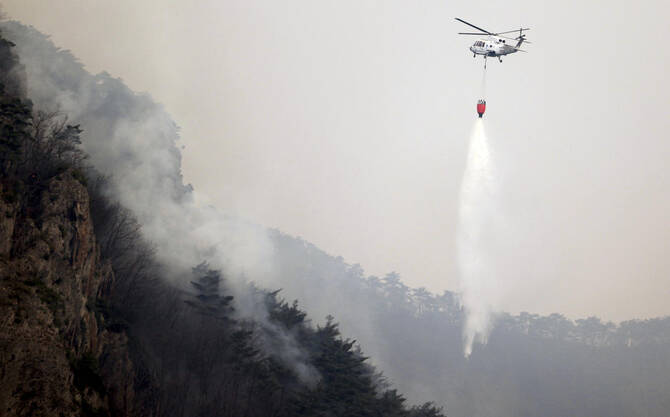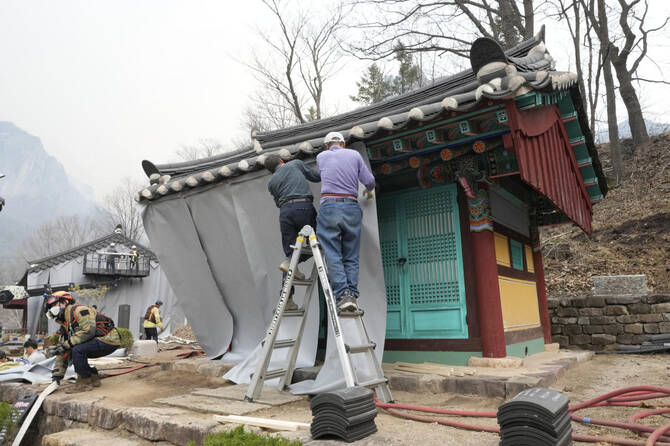ANDONG, South Korea: Wildfires raging in South Korea doubled in size on Thursday from a day earlier, as authorities called the blazes the country’s worst natural fire disaster with at least 28 people killed and historic temples incinerated.
More than 38,000 hectares (93,900 acres) have been charred or were still burning in the largest of the fires that began in the central Uiseong county, making it the biggest single forest fire in South Korea’s history. The previous record was 24,000 hectares (59,000 acres) in a March 2000 fire.
“We are nationally in a critical situation with numerous casualties because of the unprecedented rapid spread of forest fires,” Acting President Han Duck-soo told a government response meeting.
The military has released stocks of aviation fuel to help keep firefighting helicopters flying to douse flames across mountainous regions in the southeast of the country where fires have been burning now for nearly a week.
More than 120 helicopters have been deployed in three regions battling the blazes, the safety ministry said. South Korea relies on helicopters to fight forest fires because of its mountainous terrain. A helicopter pilot died on Wednesday after crashing while trying to tackle a blaze.
The wildfires that originated in Uiseong have been moving rapidly eastward, spreading almost to the coast, carried by gusty winds and with dry conditions aggravating the situation.
The Uiseong fire began spreading quickly on Wednesday, reaching the coastal county of Yeongdeok about 50 km (30 miles) away in just 12 hours, said Won Myung-soo, director of satellite imagery analysis for the national forestry service.
On Thursday evening, it rained briefly in some parts of the affected region. Precipitation of around one millimeter was too little to extinguish the main fire, but will help contain it, officials said.
About the same amount of rain is expected for some areas on Friday.
Experts have said the Uiseong fire showed extremely unusual spread in terms of its scale and speed, and that climate change is expected to make wildfires more frequent and deadly globally.
Higher temperatures amplified by human-caused climate change contributed to the existing seasonally dry conditions, “turning dry landscapes into dangerous fire fuel” in the region, the Climate Central group, an independent body made up of scientists and researchers, said in a report.
The wildfires have carved a trail of devastation through an area equivalent to about half of Singapore, ravaging everything in their path including historic temples and homes in the mountainous forest regions of North Gyeongsang province.
Teams of firefighters are on standby to protect the UNESCO World Heritage sites of Hahoe Village and the Byeongsan Confucian Academy in the city of Andong, if a blaze jumps the stream that flows around them.
The picturesque folk village has traditional Korean houses, many with thatched roofs, while the Confucian academy dates back more than 450 years.
The fires have already badly damaged other historic sites, including much of Gounsa Temple in Uiseong, which was built in 681.
“The buildings and remains of what Buddhist monks have left over 1,300 years are now all gone,” said Deungwoon, the head of the Gounsa Temple.
South Korea battles worst ever wildfires as death toll hits 28
https://arab.news/6zqfq
South Korea battles worst ever wildfires as death toll hits 28

- “We are nationally in a critical situation with numerous casualties because of the unprecedented rapid spread of forest fires,” Acting President Han Duck-soo said
- The wildfires that originated in Uiseong have been moving rapidly eastward, spreading almost to the coast
EU open to ‘compromise’ on US tariffs, says Scholz

- Trump has announced sweeping tariffs on the United States’ allies and adversaries, including a 25-percent levy on auto imports starting next week
BERLIN: German Chancellor Olaf Scholz on Sunday said the EU would respond firmly to tariffs announced by US President Donald Trump but stressed the bloc was also open to compromise.
“It is clear that we, as the European Union... will react clearly and decisively to the United States’ tariff policy,” Scholz said ahead of the opening of a trade fair in Hanover.
But the bloc was “always and at all times firmly prepared to work for compromise and cooperation,” he said.
“I say to the US: Europe’s goal remains cooperation. But if the US leaves us no choice, as with the tariffs on steel and aluminum, we will respond as a united European Union,” Scholz said.
Trump has announced sweeping tariffs on the United States’ allies and adversaries, including a 25-percent levy on auto imports starting next week.
A 25-percent US tariff on steel and aluminum from around the world came into effect in mid-March, with EU countermeasures set to begin in April.
As a major car manufacturer and exporter, Germany could be hit particularly hard by the auto tariffs and they were the subject of a visit to Washington by Finance Minister Joerg Kukies last week.
Germany has vowed a tough response to the tariffs, with a government spokesman insisting that “nothing is off the table.”
However, Italian Prime Minister Giorgia Meloni struck a more conciliatory tone on Saturday, calling for a “reasoned” approach to the escalating dispute.
EU chief Ursula von der Leyen also previously said she “deeply” regretted the US auto tariffs and the EU would “continue to seek negotiated solutions.”
Scholz on Sunday also insisted Canada was an independent country, responding to repeated comments by Trump that it should become the 51st US state.
“Canada is a proud, independent nation, Canada has friends all over the world and especially here in Germany and Europe,” he said at the Hanover trade fair.
Canada is a special guest at the event, which officially opens on Monday.
Beachcomber in France hunts fragments of migrant lives

- The item is one of many objects migrants leave behind when they board one of the small boats they hope will carry them to the English coast
GRAVELINES, France: The sand-covered notes outlining a migrant’s travel plan to a better life read like an itinerary of hope: from Ethiopia to Sudan, Libya, Italy, on to France and finally, England.
The document had traveled thousands of kilometers by the time it was picked up on a beach in Gravelines on France’s North Sea coast by a Belgian who likes to scour the beach in search of interesting things to collect.
Aaron Fabrice de Kisangani, 27, who calls himself a “beachcomber” and a “citizen scientist,” carefully unfolded the piece of paper that was soaked, dirty and covered in sand fleas, hoping for clues to the owner’s life.
The item is one of many objects migrants leave behind when they board one of the small boats they hope will carry them to the English coast. Sometimes they lose things in the hurry, and sometimes they throw them away deliberately, to travel light.
This is how shoes, clothes, bags and documents belonging to migrants end up strewn on northern French beaches, along with things left by fishermen and visitors.
Over the past two decades, Fabrice de Kisangani has made some unusual finds, including exotic plant seeds and shark teeth. He never used to pay attention to objects left by migrants, until about a year ago.
“I started to think, why don’t I take them, because otherwise they will be lost,” he told AFP.
The written notes he found probably belonged to an Ethiopian woman called Rose I., at least that is the name scribbled at the top of the page.
Rose meticulously listed cities, journey times and means of transport, drawing arrows between each entry.
The itinerary starts with “A.A.” for Addis Ababa, the Ethiopian capital. Eight hundred kilometers (500 miles) and 17 hours by car later comes Metema, on the Sudanese border. “Ten minutes on foot,” Rose predicted, would take her to Gallabat on the other side.
Then on to Khartoum, the capital of Sudan, followed by thousands of kilometers across sand, marked simply as “desert,” to Tripoli, in Libya.
Next came the voyage across the sea to Italy, followed by a train journey to France. And then, at last, the final destination: “UK.”
Fabrice de Kisangani found many other fragments of exile life during his morning search: a summons for a March 18 expulsion hearing for an Albanian in detention, or tickets from the Romanian capital Bucharest by plane to Paris, and then by train to Dunkerque in northern France.
These objects could help “humanize those people again,” because they tell “their story,” said Fabrice de Kisangani.
“I want to show the problem from another angle, as a beachcomber,” he said, admitting however that he has not worked out yet what exactly to do with the objects.
But in the meantime, the finds taught him “a lot” about the migrants, “about how they travel and how fast,” the beachcomber said, adding he often does research to find out more about their home countries and “why they are fleeing to the UK.”
Walking back to his car, Fabrice de Kisangani saw a scene playing out in the distance that has become commonplace around here: dozens of migrants emerging from the dunes and running toward a boat waiting in the water. At first they were stopped by police but, in another attempt a few minutes later, most managed to climb aboard.
A child could be heard crying. A man, one of three members of a family who didn’t make it, urged his mother to climb back off the boat, without success.
Such existential scenes, illustrating the undertaking’s fragility, are never documented in the objects jettisoned on the beach. The final pieces of the puzzle remain elusive.
Did Rose, the travel plan author, ever make it to England? Did she stick to her itinerary?
On this, the notes are silent.
US will not ‘get’ Greenland, island’s new prime minister says

- "We don’t belong to anyone else. We decide our own future,” Jens-Frederik Nielsen said in a Facebook post
- US President Trump has said he wants to make Greenland a US territory to protect it from Russia and China
COPENHAGEN, Denmark: Greenland will decide its own future and the autonomous Danish territory will not become part of the United States, its new prime minister said on Sunday, responding to Donald Trump’s latest comments about wanting the resource-rich island.
“President Trump says the United States ‘will get Greenland.’ Let me be clear: The United States will not get Greenland. We don’t belong to anyone else. We decide our own future,” Jens-Frederik Nielsen said in a Facebook post.
“We’ll get Greenland. Yeah, 100 percent,” Trump said on Sunday in an interview with NBC News.

This latest exchange culminates a week of heightened tensions between the United States, Denmark, and Greenland, marked by Vice President JD Vance’s visit to a US military base on the vast Arctic island.
Danish diplomacy on Saturday criticized Vance’s “tone,” after he said Denmark “has not done a good job by the people of Greenland.”
Danish Prime Minister Mette Frederiksen will be in Greenland from Wednesday to Friday to “strengthen unity” between the kingdom and its Arctic territory.
Four of the five parties represented in the Greenlandic Parliament reached an agreement on Friday to form a coalition government.
Greenland’s main parties all want independence, but they disagree on the roadmap. American pressure convinced them to form a coalition as quickly as possible with only the Naleraq party, which advocates rapid independence, declining to join.
Trump says he’s considering ways to serve a third term as president

- US presidents are limited to two four-year terms, but Trump suggested that Americans would go along with a third term because of his popularity
- He falsely claimed to have “the highest poll numbers of any Republican for the last 100 year,” a record held by George W. Bush
WEST PALM BEACH, Florida: President Donald Trump said Sunday that “I’m not joking” about trying to serve a third term, the clearest indication he is considering ways to breach a constitutional barrier against continuing to lead the country after his second term ends in early 2029.
“There are methods which you could do it,” Trump said in a telephone interview with NBC News from Mar-a-Lago, his private club.
He also said “it is far too early to think about it.”
The 22nd Amendment, added to the Constitution in 1951 after President Franklin D. Roosevelt was elected four times in a row, says “no person shall be elected to the office of the President more than twice.”
Any attempt to remain in office would be legally suspect and it is unclear how seriously he might pursue the idea. The comments nonetheless were an extraordinary reflection of the desire to maintain power by a president who had violated democratic traditions four years ago when he tried to overturn the election he lost to Democrat Joe Biden.
NBC’s Kristen Welker asked Trump if one potential avenue to a third term was having Vice President JD Vance run for the top job and “then pass the baton to you.”
“Well, that’s one,” Trump responded. “But there are others too. There are others.”
“Can you tell me another?” Welker asked.
“No,” Trump replied.
Vance’s office did not immediately respond to a request for comment from The Associated Press.
Derek Muller, a professor of election law at Notre Dame, noted that the 12th Amendment, which was ratified in 1804, says “no person constitutionally ineligible to the office of President shall be eligible to that of Vice President of the United States.”
Muller said that indicates that if Trump is not eligible to run for president again because of the 22nd Amendment, he is not eligible to run for vice president, either.
“I don’t think there’s any ‘one weird trick’ to getting around presidential term limits,” Muller said.
In addition, pursuing a third term would require extraordinary acquiescence by federal and state officials, not to mention the courts and voters themselves.
He suggested that Trump is talking about a third term for political reasons to “show as much strength as possible.”
“A lame-duck president like Donald Trump has every incentive in the world to make it seem like he’s not a lame duck,” he said.
Trump, who would be 82 at the end of his second term, was asked whether he would want to keep serving in “the toughest job in the country” at that point.
“Well, I like working,” the president said.
He suggested that Americans would go along with a third term because of his popularity. He falsely claimed to have “the highest poll numbers of any Republican for the last 100 years.”
Gallup data shows President George W. Bush reaching a 90 percent approval rating after the attacks on Sept. 11, 2001. His father, President George H.W. Bush, hit 89 percent following the Gulf War in 1991.
Trump has maxed out at 47 percent in Gallup data during his second term, despite claiming to be “in the high 70s in many polls, in the real polls.”
Trump has mused before about serving longer than two terms before, generally with jokes to friendly audiences.
“Am I allowed to run again?” he said during a House Republican retreat in January.
Representatives for the congressional leadership — House Speaker Mike Johnson, R-Louisiana, House Democratic leader Hakeem Jeffries of New York, Senate Majority Leader John Thune, R-S.D., and Senate Democratic leader Chuck Schumer of New York — did not immediately respond to requests for comment from the AP.
Putin congratulates Russian Muslims on Eid Al-Fitr

- Russian president also acknowledged the contributions of Muslim organizations to the nation’s public and spiritual life
MOSCOW: Russian President Vladimir Putin extended his congratulations on Sunday to the country’s Muslim community on the occasion of Eid Al-Fitr, which marks the end of the holy month of Ramadan.
In a message published on the website of the Central Spiritual Directorate of Muslims of Russia, Putin highlighted the significance of the holiday, describing it as a time of “spiritual growth, kindness, and compassion.”
According to a report by Russian state news agency TASS, the Russian president also acknowledged the contributions of Muslim organizations to the nation’s public and spiritual life, praising their involvement in charitable, educational, and patriotic initiatives.
Russian Prime Minister Mikhail Mishustin also issued a statement congratulating Muslims on the occasion.
Eid Al-Fitr is one of the most important celebrations in Islam, observed by millions of Muslims worldwide with prayers, feasts, and acts of charity.
























